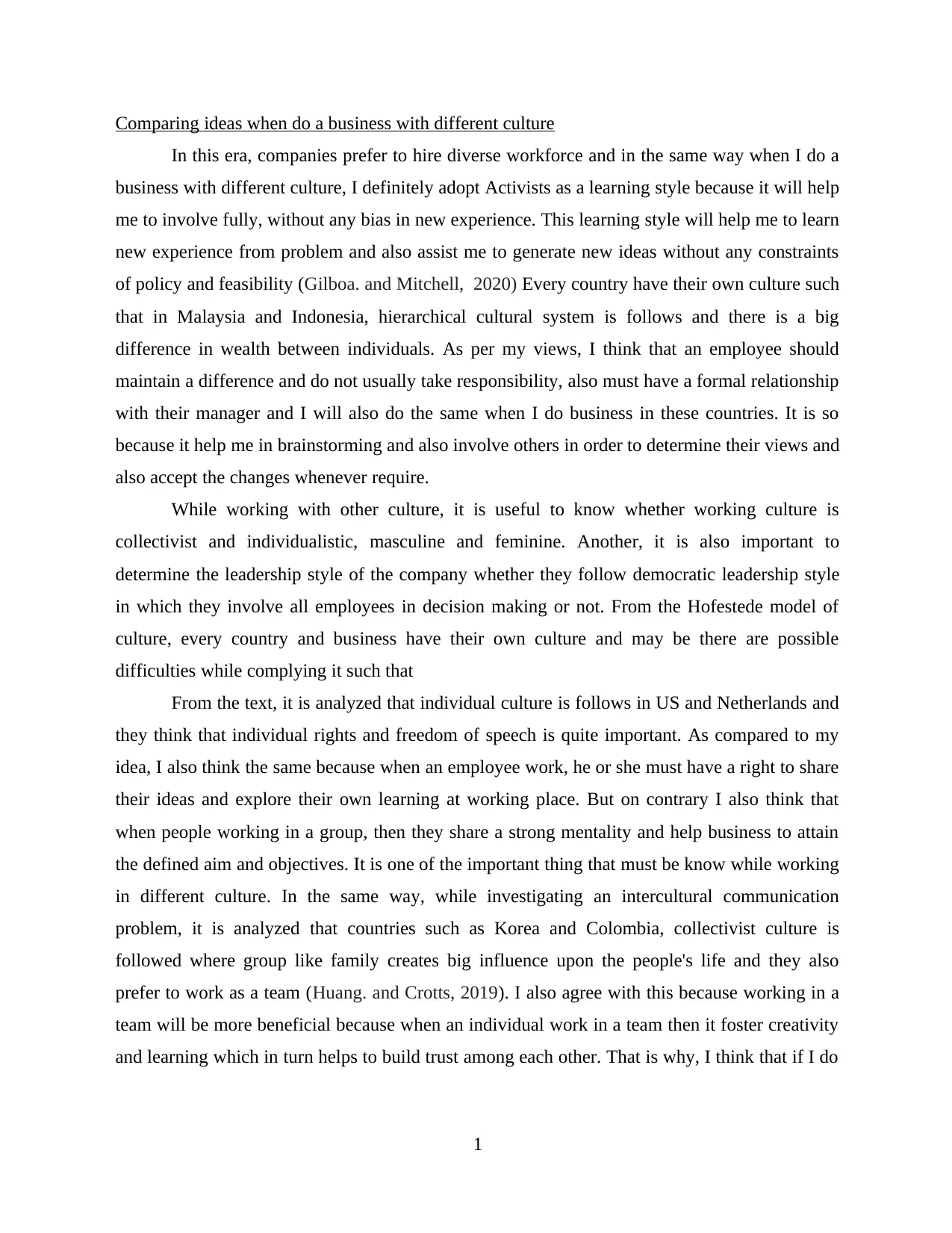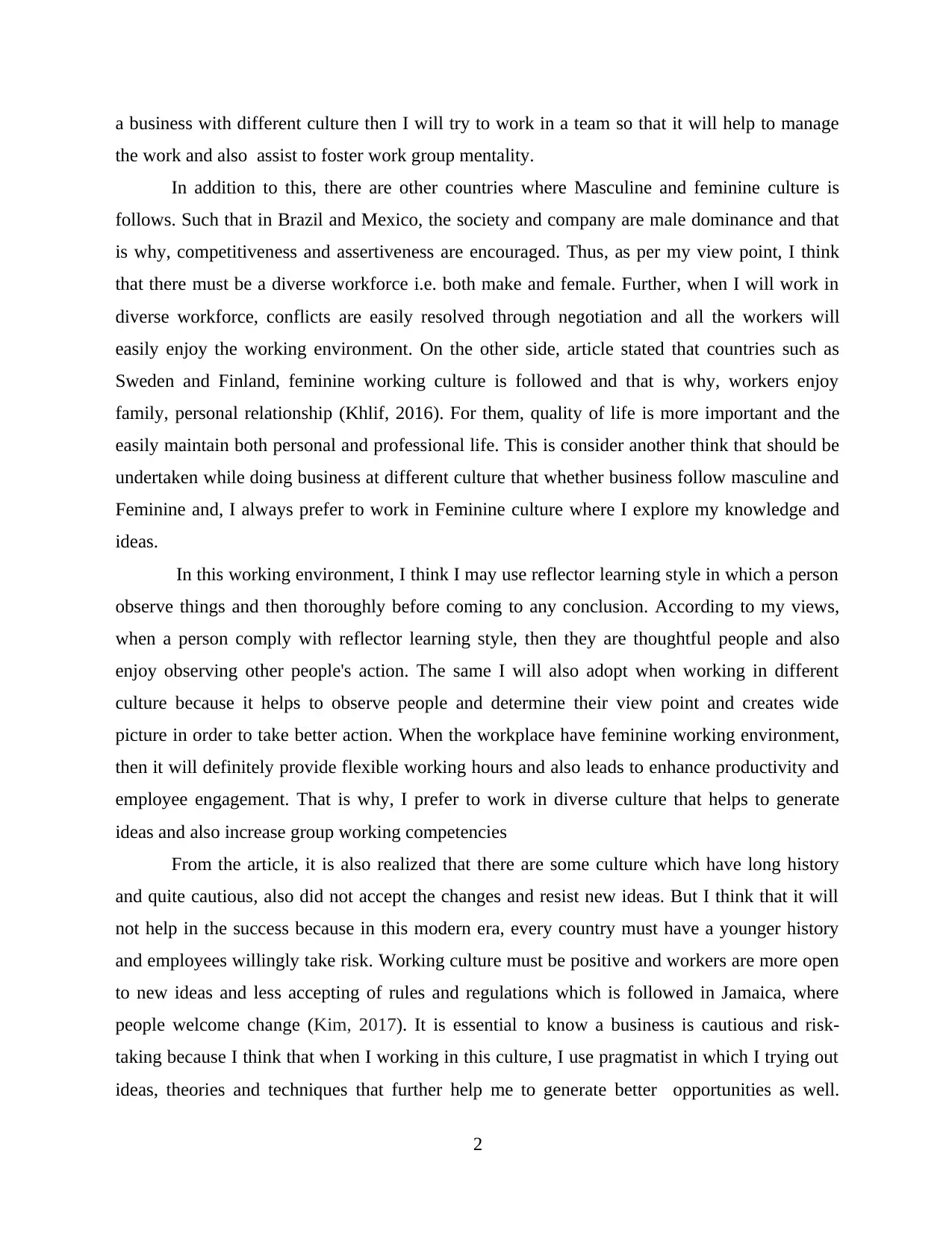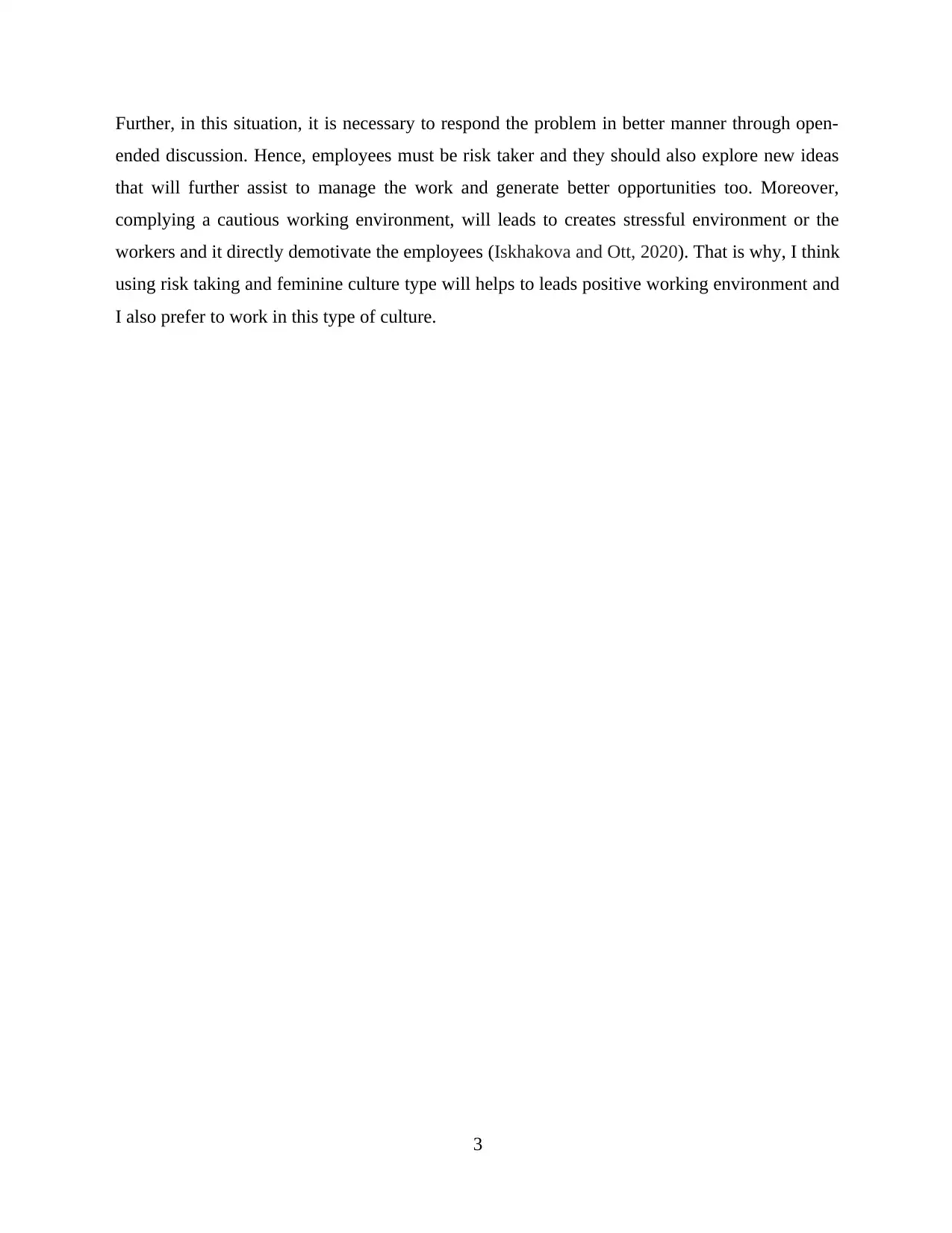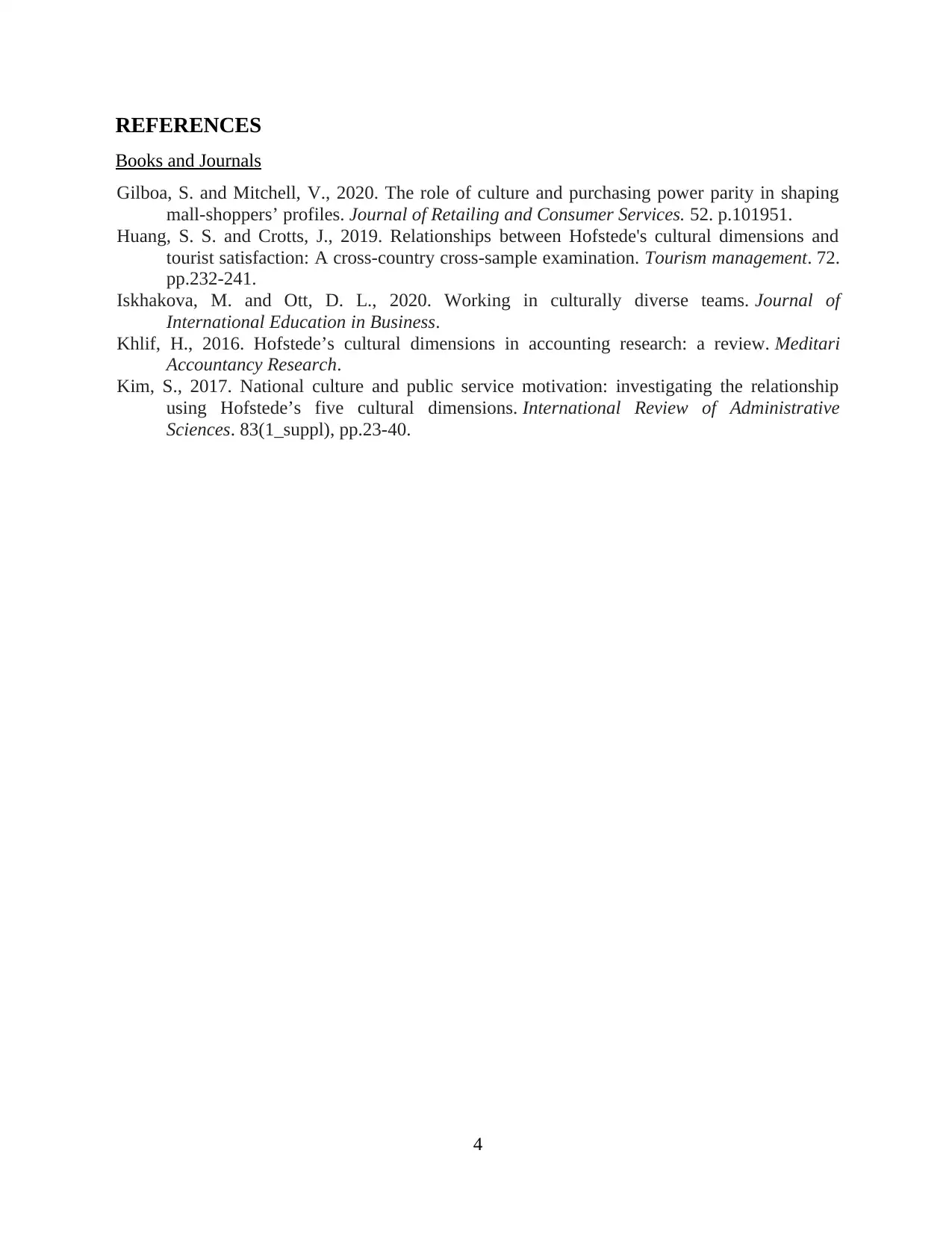Comparing Ideas: Cross-Culture Business Strategies
VerifiedAdded on 2023/01/13
|6
|1286
|79
Homework Assignment
AI Summary
This assignment examines the complexities of conducting business across different cultures. It explores the importance of understanding cultural dimensions, such as collectivism versus individualism, masculine versus feminine cultures, and hierarchical structures, referencing the Hofstede model. The paper emphasizes the significance of adapting learning styles, such as adopting Activists or Reflectors, to navigate diverse working environments. The assignment also discusses the impact of leadership styles and the need for a diverse and risk-taking workforce, highlighting the importance of open communication and adaptability to foster a positive and productive work environment. By comparing business ideas across various cultural contexts, the assignment provides insights into developing effective strategies for international business success.

Working cross culture
Paraphrase This Document
Need a fresh take? Get an instant paraphrase of this document with our AI Paraphraser

Table of Contents
Comparing ideas when do a business with different culture.......................................................1
REFERENCES................................................................................................................................4
Comparing ideas when do a business with different culture.......................................................1
REFERENCES................................................................................................................................4

Comparing ideas when do a business with different culture
In this era, companies prefer to hire diverse workforce and in the same way when I do a
business with different culture, I definitely adopt Activists as a learning style because it will help
me to involve fully, without any bias in new experience. This learning style will help me to learn
new experience from problem and also assist me to generate new ideas without any constraints
of policy and feasibility (Gilboa. and Mitchell, 2020) Every country have their own culture such
that in Malaysia and Indonesia, hierarchical cultural system is follows and there is a big
difference in wealth between individuals. As per my views, I think that an employee should
maintain a difference and do not usually take responsibility, also must have a formal relationship
with their manager and I will also do the same when I do business in these countries. It is so
because it help me in brainstorming and also involve others in order to determine their views and
also accept the changes whenever require.
While working with other culture, it is useful to know whether working culture is
collectivist and individualistic, masculine and feminine. Another, it is also important to
determine the leadership style of the company whether they follow democratic leadership style
in which they involve all employees in decision making or not. From the Hofestede model of
culture, every country and business have their own culture and may be there are possible
difficulties while complying it such that
From the text, it is analyzed that individual culture is follows in US and Netherlands and
they think that individual rights and freedom of speech is quite important. As compared to my
idea, I also think the same because when an employee work, he or she must have a right to share
their ideas and explore their own learning at working place. But on contrary I also think that
when people working in a group, then they share a strong mentality and help business to attain
the defined aim and objectives. It is one of the important thing that must be know while working
in different culture. In the same way, while investigating an intercultural communication
problem, it is analyzed that countries such as Korea and Colombia, collectivist culture is
followed where group like family creates big influence upon the people's life and they also
prefer to work as a team (Huang. and Crotts, 2019). I also agree with this because working in a
team will be more beneficial because when an individual work in a team then it foster creativity
and learning which in turn helps to build trust among each other. That is why, I think that if I do
1
In this era, companies prefer to hire diverse workforce and in the same way when I do a
business with different culture, I definitely adopt Activists as a learning style because it will help
me to involve fully, without any bias in new experience. This learning style will help me to learn
new experience from problem and also assist me to generate new ideas without any constraints
of policy and feasibility (Gilboa. and Mitchell, 2020) Every country have their own culture such
that in Malaysia and Indonesia, hierarchical cultural system is follows and there is a big
difference in wealth between individuals. As per my views, I think that an employee should
maintain a difference and do not usually take responsibility, also must have a formal relationship
with their manager and I will also do the same when I do business in these countries. It is so
because it help me in brainstorming and also involve others in order to determine their views and
also accept the changes whenever require.
While working with other culture, it is useful to know whether working culture is
collectivist and individualistic, masculine and feminine. Another, it is also important to
determine the leadership style of the company whether they follow democratic leadership style
in which they involve all employees in decision making or not. From the Hofestede model of
culture, every country and business have their own culture and may be there are possible
difficulties while complying it such that
From the text, it is analyzed that individual culture is follows in US and Netherlands and
they think that individual rights and freedom of speech is quite important. As compared to my
idea, I also think the same because when an employee work, he or she must have a right to share
their ideas and explore their own learning at working place. But on contrary I also think that
when people working in a group, then they share a strong mentality and help business to attain
the defined aim and objectives. It is one of the important thing that must be know while working
in different culture. In the same way, while investigating an intercultural communication
problem, it is analyzed that countries such as Korea and Colombia, collectivist culture is
followed where group like family creates big influence upon the people's life and they also
prefer to work as a team (Huang. and Crotts, 2019). I also agree with this because working in a
team will be more beneficial because when an individual work in a team then it foster creativity
and learning which in turn helps to build trust among each other. That is why, I think that if I do
1
⊘ This is a preview!⊘
Do you want full access?
Subscribe today to unlock all pages.

Trusted by 1+ million students worldwide

a business with different culture then I will try to work in a team so that it will help to manage
the work and also assist to foster work group mentality.
In addition to this, there are other countries where Masculine and feminine culture is
follows. Such that in Brazil and Mexico, the society and company are male dominance and that
is why, competitiveness and assertiveness are encouraged. Thus, as per my view point, I think
that there must be a diverse workforce i.e. both make and female. Further, when I will work in
diverse workforce, conflicts are easily resolved through negotiation and all the workers will
easily enjoy the working environment. On the other side, article stated that countries such as
Sweden and Finland, feminine working culture is followed and that is why, workers enjoy
family, personal relationship (Khlif, 2016). For them, quality of life is more important and the
easily maintain both personal and professional life. This is consider another think that should be
undertaken while doing business at different culture that whether business follow masculine and
Feminine and, I always prefer to work in Feminine culture where I explore my knowledge and
ideas.
In this working environment, I think I may use reflector learning style in which a person
observe things and then thoroughly before coming to any conclusion. According to my views,
when a person comply with reflector learning style, then they are thoughtful people and also
enjoy observing other people's action. The same I will also adopt when working in different
culture because it helps to observe people and determine their view point and creates wide
picture in order to take better action. When the workplace have feminine working environment,
then it will definitely provide flexible working hours and also leads to enhance productivity and
employee engagement. That is why, I prefer to work in diverse culture that helps to generate
ideas and also increase group working competencies
From the article, it is also realized that there are some culture which have long history
and quite cautious, also did not accept the changes and resist new ideas. But I think that it will
not help in the success because in this modern era, every country must have a younger history
and employees willingly take risk. Working culture must be positive and workers are more open
to new ideas and less accepting of rules and regulations which is followed in Jamaica, where
people welcome change (Kim, 2017). It is essential to know a business is cautious and risk-
taking because I think that when I working in this culture, I use pragmatist in which I trying out
ideas, theories and techniques that further help me to generate better opportunities as well.
2
the work and also assist to foster work group mentality.
In addition to this, there are other countries where Masculine and feminine culture is
follows. Such that in Brazil and Mexico, the society and company are male dominance and that
is why, competitiveness and assertiveness are encouraged. Thus, as per my view point, I think
that there must be a diverse workforce i.e. both make and female. Further, when I will work in
diverse workforce, conflicts are easily resolved through negotiation and all the workers will
easily enjoy the working environment. On the other side, article stated that countries such as
Sweden and Finland, feminine working culture is followed and that is why, workers enjoy
family, personal relationship (Khlif, 2016). For them, quality of life is more important and the
easily maintain both personal and professional life. This is consider another think that should be
undertaken while doing business at different culture that whether business follow masculine and
Feminine and, I always prefer to work in Feminine culture where I explore my knowledge and
ideas.
In this working environment, I think I may use reflector learning style in which a person
observe things and then thoroughly before coming to any conclusion. According to my views,
when a person comply with reflector learning style, then they are thoughtful people and also
enjoy observing other people's action. The same I will also adopt when working in different
culture because it helps to observe people and determine their view point and creates wide
picture in order to take better action. When the workplace have feminine working environment,
then it will definitely provide flexible working hours and also leads to enhance productivity and
employee engagement. That is why, I prefer to work in diverse culture that helps to generate
ideas and also increase group working competencies
From the article, it is also realized that there are some culture which have long history
and quite cautious, also did not accept the changes and resist new ideas. But I think that it will
not help in the success because in this modern era, every country must have a younger history
and employees willingly take risk. Working culture must be positive and workers are more open
to new ideas and less accepting of rules and regulations which is followed in Jamaica, where
people welcome change (Kim, 2017). It is essential to know a business is cautious and risk-
taking because I think that when I working in this culture, I use pragmatist in which I trying out
ideas, theories and techniques that further help me to generate better opportunities as well.
2
Paraphrase This Document
Need a fresh take? Get an instant paraphrase of this document with our AI Paraphraser

Further, in this situation, it is necessary to respond the problem in better manner through open-
ended discussion. Hence, employees must be risk taker and they should also explore new ideas
that will further assist to manage the work and generate better opportunities too. Moreover,
complying a cautious working environment, will leads to creates stressful environment or the
workers and it directly demotivate the employees (Iskhakova and Ott, 2020). That is why, I think
using risk taking and feminine culture type will helps to leads positive working environment and
I also prefer to work in this type of culture.
3
ended discussion. Hence, employees must be risk taker and they should also explore new ideas
that will further assist to manage the work and generate better opportunities too. Moreover,
complying a cautious working environment, will leads to creates stressful environment or the
workers and it directly demotivate the employees (Iskhakova and Ott, 2020). That is why, I think
using risk taking and feminine culture type will helps to leads positive working environment and
I also prefer to work in this type of culture.
3

REFERENCES
Books and Journals
Gilboa, S. and Mitchell, V., 2020. The role of culture and purchasing power parity in shaping
mall-shoppers’ profiles. Journal of Retailing and Consumer Services. 52. p.101951.
Huang, S. S. and Crotts, J., 2019. Relationships between Hofstede's cultural dimensions and
tourist satisfaction: A cross-country cross-sample examination. Tourism management. 72.
pp.232-241.
Iskhakova, M. and Ott, D. L., 2020. Working in culturally diverse teams. Journal of
International Education in Business.
Khlif, H., 2016. Hofstede’s cultural dimensions in accounting research: a review. Meditari
Accountancy Research.
Kim, S., 2017. National culture and public service motivation: investigating the relationship
using Hofstede’s five cultural dimensions. International Review of Administrative
Sciences. 83(1_suppl), pp.23-40.
4
Books and Journals
Gilboa, S. and Mitchell, V., 2020. The role of culture and purchasing power parity in shaping
mall-shoppers’ profiles. Journal of Retailing and Consumer Services. 52. p.101951.
Huang, S. S. and Crotts, J., 2019. Relationships between Hofstede's cultural dimensions and
tourist satisfaction: A cross-country cross-sample examination. Tourism management. 72.
pp.232-241.
Iskhakova, M. and Ott, D. L., 2020. Working in culturally diverse teams. Journal of
International Education in Business.
Khlif, H., 2016. Hofstede’s cultural dimensions in accounting research: a review. Meditari
Accountancy Research.
Kim, S., 2017. National culture and public service motivation: investigating the relationship
using Hofstede’s five cultural dimensions. International Review of Administrative
Sciences. 83(1_suppl), pp.23-40.
4
⊘ This is a preview!⊘
Do you want full access?
Subscribe today to unlock all pages.

Trusted by 1+ million students worldwide
1 out of 6
Related Documents
Your All-in-One AI-Powered Toolkit for Academic Success.
+13062052269
info@desklib.com
Available 24*7 on WhatsApp / Email
![[object Object]](/_next/static/media/star-bottom.7253800d.svg)
Unlock your academic potential
Copyright © 2020–2025 A2Z Services. All Rights Reserved. Developed and managed by ZUCOL.



